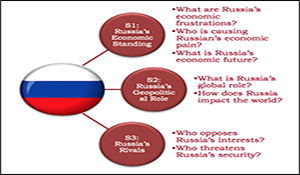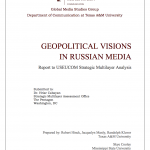Geopolitical Visions in Russian Media

Geopolitical Visions in Russian Media.
Author | Editor: Hinck, R. et al. Hinck, R. (Texas A&M University).
This study sought to examine future political, security, societal and economic trends to identify where U.S. interests are in cooperation or conflict with Russian interests, and in particular, identify leverage points when dealing with Russia in a global context.
USEUCOM requested that the SMA team initiate an effort to provide the Command analytical capability to identify emerging Russian threats and opportunities in Eurasia. The study sought to examine future political, security, societal and economic trends to identify where U.S. interests are in cooperation or conflict with Russian interests, and in particular, identify leverage points when dealing with Russia in a “global context.” In order to provide insight into these questions, this report conducted a cross-platform media analysis of Russian language media to discover emerging geopolitical threats and opportunities. This joint study was completed by researchers at Texas A&M University, University of Alabama, and Mississippi State University using the Multi-media Monitoring System (M3S) at Texas A&M University.
Media, in numerous formats, has an inordinately large role in shaping and conditioning public opinion, as well as in social organization and mobilization. Recent media in Russia reflects a deterioration of relations with the West, and seems to be contributing to a general distrust of the West among Russian citizens. This distrust is not just expressed in international politics, but in the everyday lives of many Russian citizens, leading to a palpable change in their relations with Westerners. This study sought to investigate the contours of the Russian geopolitical worldview by a close analysis of a diverse array of media sources, to determine the key narratives driving perceptions of Russia’s current economic status, its role in geopolitical relations, and its rivalry with the West.
In order to better understand the dynamics of foreign policy decision-making by the leadership of Russia, this study analyzed Russian language media (broadcast and web) to understand key frames and cultural scripts that are likely to shape potential Russian political beliefs and attitudes. Three separate studies were conducted. The first focused on Russian media coverage of economic issues. The second examined Russian multilateral engagement. The third looked at Russian media portrayals of NATO. The studies covered several months of media reports from web-based news sites, journals, and commentary, as well as broadcasts from the state-owned broadcaster Rossiya 24. Altogether, the researchers monitored over 2,500 news items from fourteen different news sources.
Key Findings:
- Russian media narratives provide a glimpse into the contours of an emerging geopolitical worldview in Russia that could dramatically impact the international order.
- Overall, this worldview positions Russia as a rational and moderate geopolitical actor, standing against the corruption and recklessness of the “Euro-Atlantic” world; namely, the United States and the European Union.
- Russian policy is committed to deflecting the economic impact of Western isolation on the Russian economy.
- Russia is committed to the development of alternatives to global political and economic institutions that are dominated by the United States and the EU. Such alternatives include increased economic ties with China and other Central Asian nations, the Eurasian Economic Union, and the BRICS nations. Russia is actively attempting to cast doubt on the credibility and integrity of Western- dominated institutions.
- Russian propaganda comments, refutes, and covers an expansive range of issues, tracking U.S. policy, NATO and exploits dissension within U.S., EU, and NATO ranks, leaving the United States at a communication disadvantage.
Implications & Recommendations
- Although Russian media typically portrays the West as seeking to constrain Russian interests (as well as the interests of other developing nations), there are gaps within those narratives that provide openings for more meaningful engagement. Potential weaknesses within these narratives include the over- dependence on resource-based economics, discomfort among Russia’s neighbors over Russian actions, and comparisons of contemporary Russian life with narratives of political openness.
- Blanket condemnation of Russian policy and Vladimir Putin are likely to fail, as they are interpreted primarily as indicative of an indiscriminate anti-Russia doctrine. U.S. messaging that seeks to strengthen groups within Russia that are seen as anti-Putin are unlikely.
- Within the Russian Federation itself, given the centralization of political discourse in Russian media, messages that merely critique or dismiss Russian messages are unlikely to break through dominant narratives anchored in historical and cultural experiences. Developing transcendent narratives that both acknowledge Russian concerns and perceptions but build upon common interests and aspirations are likely to have a greater impact than narratives that seek to isolate Putin from the Russian populace.
- Audiences exterior to the Russian Federation are more likely to be receptive to messages that highlight incoherence or lack of fidelity within Russian geopolitical narratives.
- Without clearly stated goals, U.S. involvement in countries surrounding Russia’s borders allows for Russia to present U.S./NATO activity as a threat to their own national interests.
Contributing Authors
Cooley, S. (Mississippi State University), Hinck, R. (Texas A&M University), Kluver, R. (Texas A&M University), Manly, J. (Texas A&M University), Stokes, E. (University of Alabama)

Comments